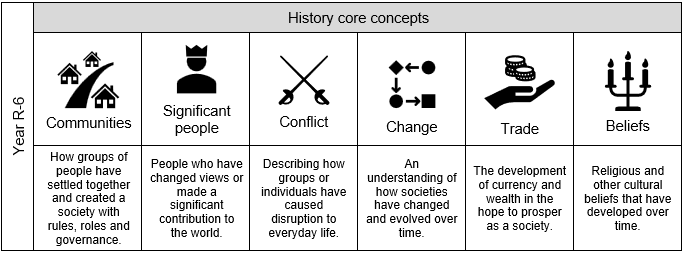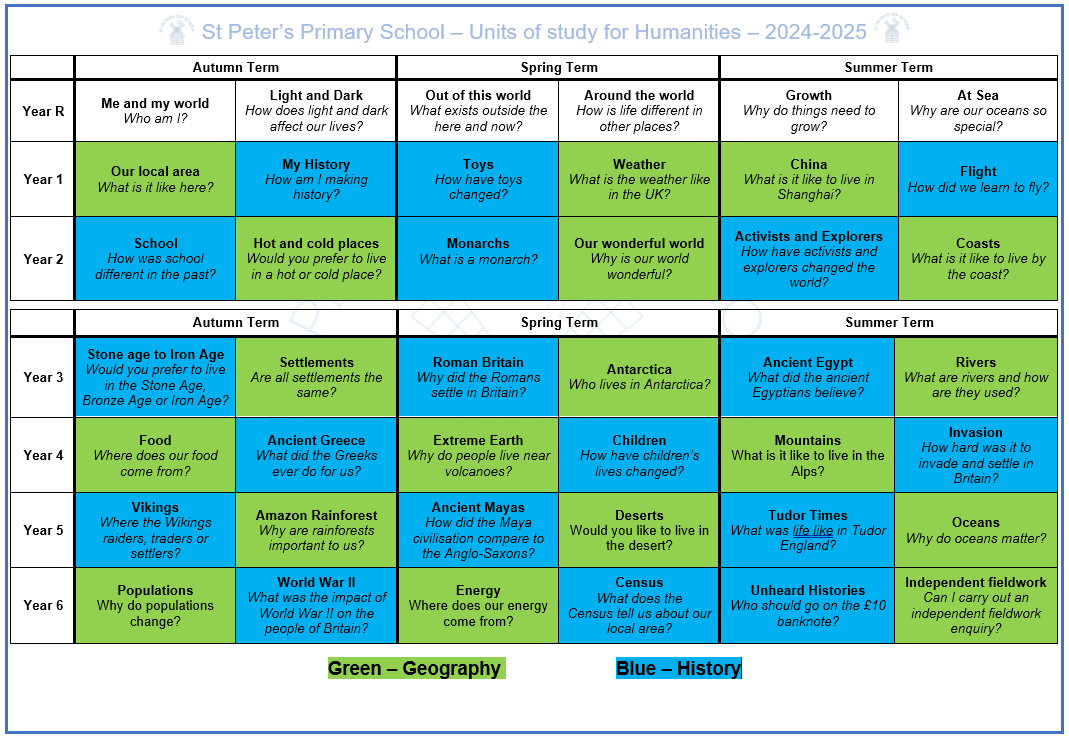History
Intent
At St. Peter’s CEP we believe that the teaching of History gives pupils an understanding of the past through learning about human achievements and experiences and that this learning is important so that we can understand our present and future. Our History curriculum aims to inspire pupils to be curious and creative thinkers who develop a complex knowledge of local and national history and the history of the wider world. We want pupils to develop the confidence to think critically, ask questions, and be able to explain and analyse historical evidence. Through our History curriculum we aim to build an awareness of significant events and individuals in global, British and local history and recognise how things have changed over time.
History will support children to appreciate the complexity of people’s lives, the diversity of societies and the relationships between different groups. Studying History allows children to appreciate the many reasons why people may behave in the way they do, supporting children to develop empathy for others while providing an opportunity to learn from mankind’s past mistakes.
Our History curriculum aims to support pupils in building their understanding of chronology in each year group, making connections over periods of time and developing a chronologically secure knowledge of History. We hope to develop pupils’ understanding of how historians study the past and construct accounts and the skills to carry out their own historical enquiries.
In order to prepare pupils for their future learning in History, our curriculum aims to introduce them to key substantive concepts and include: communities, important people, conflict, change, trade and beliefs. These six key concepts are focused on and revisited throughout our History programme of study from Year R to Year 6 at St Peter’s.

Our History curriculum is based on Kapow Primary’s History scheme of work and it enables pupils to meet the end of Key stage attainment targets in the National curriculum and the aims also align with those set out in the National curriculum.
Implementation
History is taught on a weekly basis at St Peter’s using an enquiry based approach. ‘Big’ questions are posed for each unit of study and children look to investigate in-depth different lines of enquiry to find answers to their ‘big’ question. Across the year at St Peter’s, our children will study a range of different History topics, focusing on both Substantive and Disciplinary knowledge pathways for history. Throughout key stage 1 and 2, three history topics are taught, these alternate with Geography units of work. While children will focus on Substantive knowledge content through studying historical information about specific units of study in each year group, we are also committed to developing our pupils’ disciplinary knowledge at being historians.
To ensure that our teachers are confident in the teaching of History we have chosen to use the Kapow History scheme to support our History curriculum. This school has chosen to use Kapow because of the spiral approach to learning and the quality resources which are written by specialist History teachers and educators.
In order to meet the aims of the National curriculum for History and in response to the Ofsted Research review into History, we have identified the following key strands:

Our History curriculum, based on the Kapow scheme, emphasises the importance of historical knowledge being shaped by disciplinary approaches, as shown in the diagram above. These strands are interwoven through all our History units to create engaging and enriching learning experiences which allow the children to investigate history as historians do.
Each six-lesson unit has a focus on chronology to allow children to explore the place in time of the period they are studying and make comparisons in other parts of the world. Children will develop their awareness of the past in Key stage 1 and will know where people and events fit chronologically. This will support children in building a ‘mental timeline’ they can refer to throughout their learning in Key stage 2 and identifying connections, contrasts and trends over time.

Our History Curriculum timeline supports children in developing this chronological awareness. Units are organised around an enquiry-based question and children are encouraged to follow the enquiry cycle (Question, Investigate, Interpret, Evaluate and conclude, Communicate) when answering historical questions.
Over the course of the scheme, children develop their understanding of the following key disciplinary concepts:

These concepts will be encountered in different contexts during the study of local, British and world history. Accordingly, children will have varied opportunities to learn how historians use these skills to analyse the past and make judgements. They will confidently develop and use their own historical skill set.
As children progress through the History curriculum, they will create their own historical enquiries to study using sources and the skills they have developed.
Substantive concepts such as power, trade, invasion and settlement, are introduced in Key stage 1, clearly identified in Lower key stage 2 and revisited in Upper key stage 2 allowing knowledge of these key concepts to grow.
These concepts are returned to in different contexts, meaning that pupils begin to develop an understanding of these abstract themes which are crucial to their future learning in History.
Our History curriculum follows the spiral curriculum model where previous skills an d knowledge are returned to and built upon. For example, children progress by developing their knowledge and understanding of substantive and disciplinary concepts by experiencing them in a range of historical contexts and periods. History in Action videos explain the careers and work of those in history and heritage-related fields. Historians, archivists, archaeologists, museum curators, teachers and heritage experts discuss their love of history, how they became interested in the subject, how they got into their jobs and what their jobs involve.
d knowledge are returned to and built upon. For example, children progress by developing their knowledge and understanding of substantive and disciplinary concepts by experiencing them in a range of historical contexts and periods. History in Action videos explain the careers and work of those in history and heritage-related fields. Historians, archivists, archaeologists, museum curators, teachers and heritage experts discuss their love of history, how they became interested in the subject, how they got into their jobs and what their jobs involve.
History lessons are designed to be varied, engaging and hands-on, allowing children to experience the different aspects of an historical enquiry. In each lesson, children will participate in activities involving disciplinary and substantive concepts, developing their knowledge and understanding of Britain’s role in the past and that of the wider world. Children will develop their knowledge of concepts and chronology as well as their in-depth knowledge of the context being studied.
Strong subject knowledge is vital for staff to be able to deliver a highly-effective and robust history curriculum. Each unit of lessons focusses on the key subject knowledge needed to deliver the curriculum, making links with prior learning and identifying possible misconceptions.
Impact
The past is a spotlight on the present. Knowing how the past developed, pupils at St Peter’s will be able to better connect the past to the ‘here and now’. Pupils at St Peter’s will be curious about the world around them and be inspired to be a lifelong learner of History. It is through our six key concepts in our History curriculum (settlements and communities, conflict and invasion, hierarchy, societal change and revolution, trade and religion) that children at St Peter’s will have instilled a love of learning, a grasp of how the world works and a confidence to extend horizons. Pupils will have developed historical and chronological knowledge and understanding, as well as skills to help understand people and societies.
The impact of our History curriculum can be constantly monitored through both formative and summative assessment opportunities. Each lesson includes guidance to support teachers in assessing pupils against the learning objectives. Furthermore, each unit has a skilled catcher and knowledge assessment quiz which can be used at the end of the unit to provide a summative assessment. After following our History curriculum, pupils should leave school equipped with a range of skills to enable them to succeed in their secondary education. They will be enquiring learners who ask questions and can make suggestions about where to find the evidence to answer the question. They will be critical and analytical thinkers who are able to make informed and balanced judgements based on their knowledge of the past.
The expected impact of following our History curriculum is that children will:
- Know and understand the history of Britain, how people’s lives have shaped this nation and how Britain has influenced and been influenced by the wider world.
- Develop an understanding of the history of the wider world, including ancient civilisations, empires, non-European societies and the achievements of mankind.
- Develop a historically-grounded understanding of substantive concepts - power, invasion, settlement and migration, civilisation, religion, trade, achievements of mankind and society.
- Form historical arguments based on cause and effect, consequence, continuity and change, similarity and differences.
- Have an appreciation for significant individuals, inventions and events that impact our world both in history and from the present day.
- Understand how historians learn about the past and construct accounts.
- Ask historically-valid questions through an enquiry-based approach to learning to create structured accounts.
- Explain how and why interpretations of the past have been constructed using evidence.
- Make connections between historical concepts and timescales.
- Meet the end of key stage expectations outlined in the National curriculum for History
There are planned ‘end points’ for each year group in key stage 1 and for lower and upper key stage 2. These have been taken from the Kapow Scheme and they are based directly on the National Curriculum. The end points are used to make end of year assessments which are recorded on our tracking system ‘Insight’ and which are then share with parents as the following statements: below, expect or above. A record of the pupil’s attitude towards the study of History is also shared with parents in the end of year report in an effort comment.
As Historians, children will be able to speak confidently about their historical experiences using the correct vocabulary and knowledge.
We also measure the impact of our curriculum through the following methods:
- Assessing children’s understanding of topic linked vocabulary through various ways, including quizzing, retrieval practice, etc.
- Summative assessment of pupil discussions about their learning.
- Images and videos of the children’s practical learning.
- Interviewing the pupils about their learning (pupil voice).
- The subject lead ensures that the National Curriculum requirements are being met across EYFS, KS1 and KS2.
- Moderation and scrutiny of pupil’s books and professional dialogue between teachers to assess the quality of children’s learning.
- Sharing good practice in staff meetings.
- Clear next steps are determined by a cycle of monitoring, evaluating and reviewing.
- Marking of written work in books.
Useful websites:
- History Association - www.history.org.uk/
- BBC Bitesize - www.bbc.co.uk/bitesize/primary
- National Geographic Kids - www.natgeokids.com/uk/category/discover/history/
